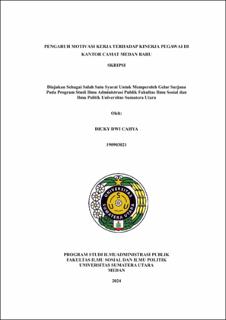| dc.description.abstract | Work motivation is a key factor in an organization because strong motivation can encourage employees to work more effectively and efficiently. This shows that motivation acts as the main foundation of a person in joining and contributing to various organizations. The study used qualitative methodology and collected key data through questionnaires. The sample of this study included the entire population of 21 employees. Data analysis was performed by utilizing SPSS software and simple linear regression methods.
This study takes the variable of work motivation from the perspective of Anwar Prabu Mangkunegara (2009: 93) in Bayu Fadillah, et al. (2013: 5). It includes indicators such as responsibility, job performance, opportunities for advancement, recognition of performance, active employment. Meanwhile, employee performance variables are measured based on six indicators described by Robbins (2016: 260), namely quality, quantity, time applicability, effectiveness, independence, and work commitment. From the analysis conducted, it was concluded that the motivation variable in the work showed a significance value of 0.000, which indicates that the effect is smaller than the critical value of 0.05.
Results indicates a positive and significant relationship between work motivation and employee performance at the Medan Baru sub district office. As for the variable of work motivation in work, the responsible indicator gets a percentage of strongly agreeing with 57.1%, the work performance indicator of 57.1% in the agreeing category, the chance to advance is 47.6% in the disagree category, recognition of performance is 42.9% in the disagree category, and the active role in work gets a percentage of strongly agreeing with 52.4%. In employee performance variables, most respondents chose the category agreeing on indicators of quality (52.4%), quantity (66.7%), and effectiveness (47.6%), while punctuality indicators got the category of strongly agree with the percentage (42.9%). However, on indicators of independence (47.6% disagree) and work commitment (57.1% strongly agree). | en_US |


